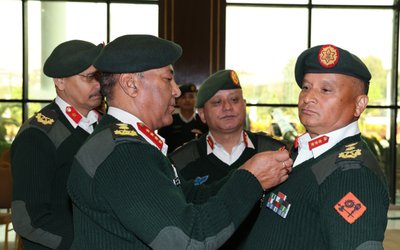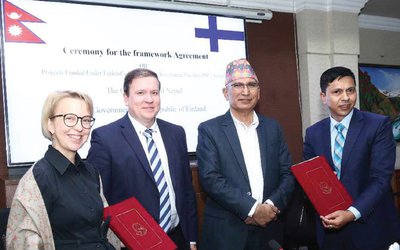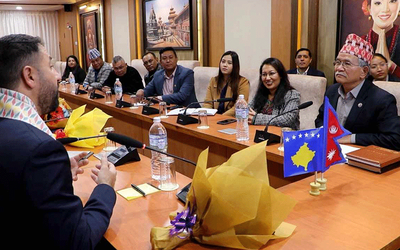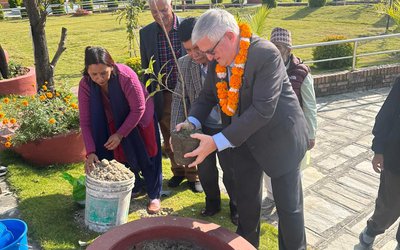
As Nepal is ranked one of the most vulnerable countries in the world to natural disasters, there is the need to prepare the people to adapt with the hostile scenario. With frequent extreme events and human interventions, large numbers of people have been suffering from floods, landslides, GLOF, droughts, thunderstorms and cold-waves.
In this context, the implementation of Catalyzing Econ-system Restoration for Resilience Natural Capital and Rural Livelihoods in degraded forests and Rangelands of Nepal (EbA2) is a major event.
At a time when there is rampant destruction of natural resources including forest areas, there is the need to increase awareness at the community and locally elected level. With a priority of promoting community based adaptation through integrated management of agriculture, water, forest and biodiversity sector, forest and eco-system management for supporting climate led adaptation innovations and eco-system management for climate adaptation, EbA2 has its own character.
Thanks to the efforts of secretary of Ministry of Forest and Environment Dr. Bishwa Nath Oli, the project, which was at the stage of collapse, has finally revived.
This is what Moon Shrestha, Task Manager Climate Change Adaptation Unit of UNEP, has revealed in the inception workshop. She also thanked secretary Dr. Oli for playing an important role to materialize the project. She said that the project will be implemented and monitored by user groups.
Minister of Forests and Environment (MoFE) Shakti Bahadur Basnet said that sustainable development is impossible without preservation and protection of the environment.
Inaugurating Project Inception Workshop of Catalyzing Econ-system Restoration for Resilience Natural Capital and Rural Livelihoods in degraded forests and Rangelands of Nepal (EbA2), minister Basnet said that this project will help generate awareness at local level about the importance of ecosystem based development.
A joint undertaking of Ministry of Forest and Environment, UNEP and Ministry of Administration and Local Development as collaborating partners, the project is funded by Least Developed Countries Fund (LDCF).
Implemented with a goal to reduce the climate vulnerability of local communities in Nepal, the project is going to increase the capacity of the government and local communities in Nepal to adapt to climate change by implementing EbA in degraded forests and rangelands in mid-hill and high mountain areas.
Minister Basnet said that Nepal has been passing through new phase of three-tier government, from center, province and local levels. "There certainly is the need to readjust local governments during the time of implementation," said Minister Basnet.
"At a time when there is a growing debate over development and environment protection, this project will help disseminate the perception of how sustained development is possible with preservation of forests," said Minister Basnet. "Whether one likes it or not, EIA and IEE are now mandatory conditions for development and both issues are not anti-development. EIA and IEE will facilitate sustainable development."
Minister Basnet said that forest and environment are the property of all human beings and we need to preserve them for future generations. Whether the issue of Nijgadh Airport, construction of transmission line or road, all need to think about starting the project with minimum damage of forest and ecosystem.
Addressing the program, Secretary of Ministry of Forest and Environment Dr. Bishwanath Oli said that the project design had started in 2012 in one context and it is now implemented in a different political and governance context with the election of center, province and local levels. He assured concerned stakeholders that the EBA project will address all the concerns of local levels in the implementation stage. He also thanked UNEP for its contribution and support to materialize the project.
"With modification in implementation stage, the project will be closely working with local level and community," said Dr. Oli. He said that the environment is not only an issue of national concern, this is also an issue of international concern.
"Development is the need of people. However, development can be disastrous if it fails to preserve the environment. Preservation of environment is important part for sustainable development. As the government is in the process of drafting new Environment Protection Act, it will help to manage development and environment."
Delivering the opening statement and highlighting the objective of the workshop, Dr. Maheshwar Dhakal, chief of Climate Change Management Division and National Project director of EbA2, said that the objective of the inception workshop is to present the project in detail, including implementation and execution arrangements. He said that this also aims to assist relevant project stakeholders understand their role/ responsibilities and take ownership of the project interventions from the very start and to develop a common understanding.
He said that EbA will be implemented and monitored by user groups to restore forests and rangelands in the mid-hills of Achham and Salyan and high mountains of Dolakha to decrease the sensitivity of local communities to climate change.
With the total cost of $5.2 million, a total of 12072 households with a population of 59172 are expected to benefit from the EbA targeted interventions. According to Dr. Dhakal, at least 1000 ha of degraded forest will be restored using EbA and 450 ha of rangeland restored. During the three years implementation period, 100 operational management plants will be restored, 36 filtering dams will be constructed and 120 ha of improved terraces will be developed. Similarly, 36 filtering dams constructed, 36 water conservation pond and 24 community rain water harvesting devices will be constructed.
Delivering the statement at the inception workshop, Moon Shrestha, Task Manager, Climate Change Adaptation Unit of UNEP, said that there is a certain delay in the implantation of the project expressing hope that this is going to help to reduce the risk of climate change to vulnerable communities and also increase the capacity of the government. She said that this is the third EbA project in Nepal and will be implemented and monitored by user groups.
Attended by various stakeholders from districts, local level, government officials and media persons, Ram Hari Panth, National Project Coordinator, presented details of EbA 2 projects. He said that the project will increase the capacity of government officials, local user groups to implement EbA 2 through enhanced institutional arrangements, intersectoral collaboration and research. He said that demonstration intervention will increase adaptive capacity to climate change and restore natural capital.
- PM Oli's Visit To China: Geopolitical Implications
- Nov 19, 2024
- NEA: Kul Man Ghising, A Cool Man
- Oct 28, 2024
- DASHAIN FESTIVAL : Festival of Unity
- Oct 04, 2024
- NEPAL-CANADA Bilateral Meeting
- Oct 04, 2024
- MIDDLE BHOTEKOSHI: Final Stage
- Sep 23, 2024
















